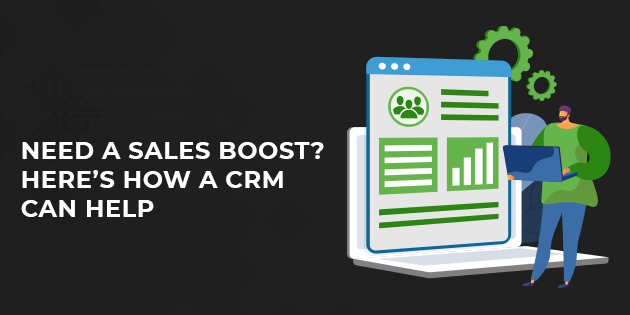The benefits of using a CRM should be unquestionable by now. After all, there are many examples of how these tools help drive sales through the roof. Here are the main reasons why your business should adopt a CRM right now.
Customer relationship management, or CRM, tools offer amazing functionality when it comes to gathering sales data. These tools help monitor and analyse sales, performance, and results. If used properly, a CRM can lead to optimisation and, consequently, a more effective sales process.
While the benefits of a CRM are apparent to sales managers, salespeople don’t always share the same viewpoint. In fact, your average rep might initially resist the idea. This is because, from a salesperson’s point, the CRM only represents more work and additional time for data input.
Paradoxically, a CRM might be most beneficial for salespeople. In fact, studies have shown that a CRM can provide significant assistance in reaching sales quotas. It’s because the tool allows for better qualifying and following up on leads, placing a stronger focus on sales activities.
But there are even more ways a CRM can contribute to a business, resolving critical issues as well as some less apparent problems. It’s clear that the right CRM can transform your business and take your sales to a whole new level.
If you want to make the most of a CRM, you’ll need to find a platform that suits your needs the most. Luckily, with all of the available options, that won’t be a problem.
Let’s take a deep dive into how a CRM can boost sales and bring an overall improvement to your business.

How CRM Helps Your Business Increase Sales
1. Creating Repeatable Processes
When you install and adopt a CRM and integrate your sales process into it, the process becomes unified and consistent. Having well-defined processes that work every time is, obviously, crucial for every business.
A CRM can serve as a sales process guideline for all salespeople, creating a routine that you can further refine and improve. Once you nail the perfect recipe, repeatable processes can save money and time, with your CRM playing a central role.
2. Streamlining Collaboration
When a business starts growing, its teams will likewise expand. The more the internal departments develop and grow, the higher the chances are for data silos to start appearing. Silos form when certain chunks of data become exclusive to one department, which could spell considerable trouble for the whole company.
How?
For instance, your marketing department could have one contact list, the social media team another, and your sales department might have a third set of contacts. As long as people in different areas aren’t aware of who holds what data, those lists could overlap.
If this sounds complicated on paper, imagine what it’s like in everyday operations.
With a unified record managed by your CRM, these complications will go away. You’ll be able to customise contact lists for every department according to its needs. And because there’s a company-wide shared system, the data will always be up to date.
3. Segmenting Customers
CRMs are very effective when it comes to gathering customer data. Behaviour analysis plays a significant part here, as your CRM can garner information about customer’s buying habits, social media activity, and more.
Of course, this data will be invaluable for segmenting customers and creating tailor-made offers for different groups. If you target each segment with an offer specifically designed to fit the particular needs of customers within it, you’ll undoubtedly be able to boost your sales.
4. Centralising and Documenting the Sales Process
Even if you already have a proven sales process, it might not be found in one place or equally distributed among your salespeople. It’s much more challenging for individual team members to catch up on any updates in such situations.
Many companies have a handful of key people who have a firm grasp of the processes. The downside here is that should one of those go-to people leave, productivity would experience a sharp drop.
A CRM doesn’t allow for such drops to happen. It keeps your processes, activities, and policies well-documented and always within reach. This means if your company loses a key team member, no part of your process will be lost with them. Additionally, you’ll have an easier time bringing new employees up to speed.
With the significant productivity boost brought by centralisation and documenting your sales process, both your revenue and customer service will likely improve.
5. Promoting Cohesion of Marketing and Sales
Most smaller businesses that don’t use a CRM either keep their contact lists unsegmented or do a poor job of segmenting those lists. This low level of customer management leads to disparities between the marketing and sales divisions.
For example, it might happen that all contacts receive the same offer or lead magnet, even though some of them are prospects while others are already returning customers. While this initially doesn’t sound like a serious transgression, it can prove quite harmful.
Also, if people keep receiving generic emails that are obviously aimed at everyone, they’ll start seeing your campaign as nothing more than noise.
On the other hand, you could send an offer to the wrong contact list. The results will be similar to the first example, if not worse.
A CRM will help you avoid such scenarios that can lead to lost customers.
Also, it will help you bring the efforts of your marketing and sales departments together. You can use robust reporting and the abundance of data to coordinate your team’s actions. Campaign reports analysis will inform your sales team how to target specific groups, while purchase data can help the marketing department design custom-made campaigns.
6. Boosting Customer Service and Retention
Your sales team will gain valuable information about every customer and their history through your CRM. The relevant data will help salespeople better prepare for interaction with customers, resulting in a higher chance of success.
CRMs feature lead and customer lists with dedicated fields for feedback from sales team members. These lists will serve as a shared knowledge base, allowing for better planning and coordination. As a result, your customer service will rise to a new level.
When the whole team has insight into the touchpoints for every customer, your salespeople will gain a better understanding of what your customers need.
This awareness of the specific pain points, wants, needs, and interests promotes customer satisfaction. Everyone appreciates when they’re treated with respect and care after all.
Furthermore, one salesperson might already have a well-developed, authentic relationship with a lead. If you need to transfer that lead to a different team member, the shared data that CRM supplies will make the transition seamless.
Obviously, a higher focus on customer service and experience is crucial to customer retention. With the right CRM, your chances of maintaining a loyal client base will be much higher.
7. Better Automation
The primary purpose of a CRM is to gather data and generate extensive reports. On its own, CRM already provides a significant advantage for marketing and sales funnelling.
But when combined with automation software, your CRM becomes a powerhouse. CRM will collect the data and score leads according to their interests. Then, marketing automation takes over at that point and launches campaigns that target specific segments with interactive material.
You’ll have a machine that drives your marketing and sales to the maximum.
8. Making Your Sales Cost Less
Your CRM helps you define a consistent sales process and personalised messaging. With those two elements in place, you can build trust with customers more easily. Unsurprisingly, people will make recurring purchases from businesses they see as reliable and trustworthy.
Simultaneously, the CRM platform can contribute to brand awareness and visibility. This happens somewhat indirectly, as your CRM boosts sales efficiency and cross-selling, makes closing time shorter, and improves referral business.
Through all this, your business gains more authority and becomes more credible. As a result, you get plenty of returning customers. That’s how you can save on sales expenses – retaining customers is cheaper and much more straightforward than attracting new ones after all.
9. Data Safety
Although managing customer data through a spreadsheet might seem convenient and practical, it comes with a significant downside.
Businesses that manage their databases on their own run the risk of jeopardising precious data. And losing information is much easier than it seems.
Files can get corrupted or even deleted by accident. Hardware storing the database can get misplaced or stolen, and no hard drive’s safe from malfunctions. Granted, cloud storage is much safer, but controlling different document versions that float around becomes challenging after a while.
Finally, there’s no sure way to protect your data from a formidable hacking attack.
CRM databases alleviate all of these issues. The data is completely safe from any accidental or malicious tampering, nor is it possible for anyone to ever forget it on a cafe table downtown. You can rest assured that a system crash and subsequent downtime won’t stand in the way of everyday operations.
All things considered, a CRM provides you with a superior way of storing customer databases and keeping them readily accessible.

Leverage a CRM to Drive Your Sales Sky-High
There’s almost no aspect of business that won’t benefit from adopting a CRM. It’s a valuable addition to every business, big or small.
You can leverage your CRM to improve customer relations, personalise your marketing and sales interactions, and handle crucial data with confidence.
With a centralised, well-documented sales process and contact lists, your teams will be able to concentrate on the vital aspects of their work. You’ll save time and money that would otherwise be spent on handling technicalities and patching up information gaps.
If you’re ready to introduce a CRM and boost your sales, Automation Agency is here to provide support. Our Concierge Service will help you select, set up, and get the most out of your CRM.
Click on this link to visit our site, find out more about our services, and get in touch.


